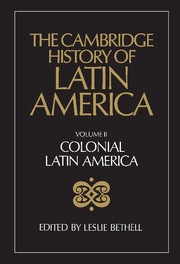Book contents
- Frontmatter
- PART ONE POPULATION
- PART TWO ECONOMIC AND SOCIAL STRUCTURES: SPANISH AMERICA
- 3 The urban development of colonial Spanish America
- 4 Mining in colonial Spanish America
- 5 The formation and economic structure of the hacienda in New Spain
- 6 The rural economy and society of colonial Spanish South America
- 7 Aspects of the internal economy of colonial Spanish America: labour; taxation; distribution and exchange
- 8 Social organization and social change in colonial Spanish America
- 9 Women in Spanish American colonial society
- 10 Africans in Spanish American colonial society
- 11 Indian societies under Spanish rule
- PART THREE ECONOMIC AND SOCIAL STRUCTURES: BRAZIL
- PART FOUR INTELLECTUAL AND CULTURAL LIFE
- Bibliographical essays
- References
11 - Indian societies under Spanish rule
from PART TWO - ECONOMIC AND SOCIAL STRUCTURES: SPANISH AMERICA
Published online by Cambridge University Press: 28 March 2008
- Frontmatter
- PART ONE POPULATION
- PART TWO ECONOMIC AND SOCIAL STRUCTURES: SPANISH AMERICA
- 3 The urban development of colonial Spanish America
- 4 Mining in colonial Spanish America
- 5 The formation and economic structure of the hacienda in New Spain
- 6 The rural economy and society of colonial Spanish South America
- 7 Aspects of the internal economy of colonial Spanish America: labour; taxation; distribution and exchange
- 8 Social organization and social change in colonial Spanish America
- 9 Women in Spanish American colonial society
- 10 Africans in Spanish American colonial society
- 11 Indian societies under Spanish rule
- PART THREE ECONOMIC AND SOCIAL STRUCTURES: BRAZIL
- PART FOUR INTELLECTUAL AND CULTURAL LIFE
- Bibliographical essays
- References
Summary
In Spanish American studies Indian history of the colonial period is a relatively new topic. Throughout the nineteenth century and into the twentieth it was a widely held assumption that little or nothing of consequence in Indian life survived the conquests of the sixteenth century. The view was consistent with the classic writings on conquest, famous for their descriptions of massacres, tortures, and military victories unrelated to events before or after. The conquests appeared to be so concentrated, so cataclysmic, so dramatic in their confrontations of European soldiers with American natives, that no one questioned their power to annihilate. The classic writers knew that individual Indians survived to be utilized by the conquerors as slaves and labourers and tribute-payers. But the prevailing view was that none of the political, social, or cultural values of the American civilizations escaped destruction. The clear implication was that for Indians the aftermath of the conquests was deculturation and stagnation.
The view that no Indian culture persisted after the conquests was consistent with the Leyenda Negra (Black Legend), the tradition of anti-Hispanic criticism that developed in the sixteenth century, flourished in the seventeenth, eighteenth, and nineteenth centuries, and continued to exert an influence on interpretations of Spanish and Spanish American history in the twentieth century. The critics of Spanish colonialism argued that the conquistadores were inhumane and that an important consequence of their inhumanity was the unnecessary destruction of American Indian civilizations. Thus the Black Legend emphasized Spanish insensitivity, as if a less crude conqueror, or one with more appreciation for native American cultures, would have salvaged something for the post-conquest future.
- Type
- Chapter
- Information
- The Cambridge History of Latin America , pp. 381 - 420Publisher: Cambridge University PressPrint publication year: 1984
References
- 6
- Cited by



